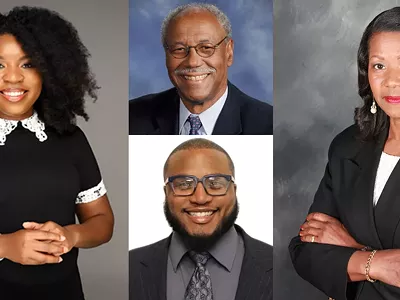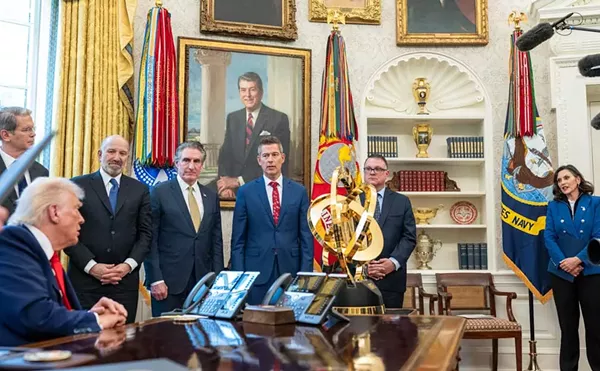
Audio By Carbonatix
[
{
"name": "GPT - Leaderboard - Inline - Content",
"component": "35519556",
"insertPoint": "5th",
"startingPoint": "3",
"requiredCountToDisplay": "3",
"maxInsertions": 100,
"adList": [
{
"adPreset": "LeaderboardInline"
}
]
}
]

Nearly half of Detroit City Council's members are not running for reelection, including President Brenda Jones, André Spivey, Raquel Castañeda-López, and Gabe Leland, who resigned after pleading guilty of accepting a cash bribe, creating a competitive race with more than 40 candidates. Candidates who did not respond to Metro Times' questionnaire include District 1 incumbent James Tate, District 4's Daivon Reeder and Virgil Smith, and District 7's William Davis, Regina Ross, and JoAnna Underwood. Here are the ones who took the time to tell us — all of us — what they hope to accomplish on the City Council.
Detroit City Council At-Large
Janeé L. Ayers

At-large City Council incumbent Janeé L. Ayers has had her seat for the past six years, serving as chair of the Budget, Audit, and Finance Committee and vice chair of the Public Health & Safety Committee. Before City Council, Ayers worked as a mortgage banker for Quicken Loans and in hospitality for MGM Grand Casino, where she was a member of the UNITE HERE Local 24 bargaining team and was former vice president of the Metro Detroit AFL-CIO.
Ayers says she believes "the best way to move Detroit forward is to create new opportunities for residents," and has cast key votes on projects to generate jobs for Detroiters. Of Detroit's "turnaround," Ayers says, "There is no comeback for Detroit unless it includes ALL Detroiters." She sponsored the Fair Chance Ordinance, which ensures that formerly incarcerated Detroiters are not discriminated against. "I believe that no one in Detroit should be shut out of opportunities to succeed," she says. "That's why I led the Returning Citizen Task Force, which has helped more than 1,500 returning citizens in our community find jobs and get training to learn the skills they need to start fresh." She adds, "I know that having access to quality jobs and education can make the difference between someone returning to a life of crime or having a prosperous life. In partnership with the ACLU of Michigan, I sponsored and passed the Fair Chance Housing ordinance, which requires residential developments to not ask for criminal history during background checks. As the chair of Budget, Audit and Finance Committee, I've also worked to increase our procurement of minority-owned businesses and through Small Business Empowerment fairs, provided business owners or prospective business owners with resources to fulfill their visions."
She says financial responsibility and management will be one of her top priorities for this next term, following the cuts Detroit made during its bankruptcy. She says she will also continue to advocate for the formerly incarcerated.
Jermaine Lee Jones
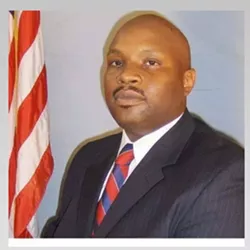
Of Detroit's "turnaround," Jones says, "Mayor Duggan's tenure can be viewed as an analogy for Detroit's revitalization process," he says. "He was elected and came into office and worked to rid Detroit's geographical landscape of blight and dilapidated structures and effectively did so all while keeping Detroit's financial affairs in order. Now that we're back on solid ground, it's time to allow the people to retake full ownership over Detroit's affairs."
Jones says if elected he will call for partnerships with Oakland and Macomb counties to create regional mass transit. "Now's the time to allow the democratic process that this country was founded upon to work for the people of the neighborhoods so that we can develop plans to rebuild Detroit's economic landscape and create jobs and development that favors the people, the working class," he says. He also says he will push for Detroit to become an International Economic Empowerment Zone to bring blue-collar manufacturing jobs to Detroit. "If elected, I will fight for Detroit's evolution," he says.
Nicole Small

Of Detroit's "turnaround," Small says, "Detroit's turnaround has mastered the art of rebuilding downtown, and advancing corporate welfare at the expense of neglecting the many crisis that the majority of Detroiters are facing. This turnaround has resulted in shutting off access to water of more than 250,000k Detroit homes, while burdening most residential homes with unaffordable bills to supplement the water bills for large arenas and corporations downtown; and charged Detroiters exorbitant drainage fees, but the water isn't being drained so residents homes are backed up with water, sewage, and feces. This turnaround has contributed to the overtaxing of Detroit homeowners causing illegal foreclosures while offering hundreds of millions of dollars in tax credits to multi-millionaires/billionaires; investing millions into bike lanes made for cars and streetscapes instead of sidewalk repair and improved public transportation."
She adds, "I would request an audit of how much funding has been used for improving the infrastructure of our water system and the bills of large corporations downtown. My commitment as a Councilperson would be to support a water affordability plan as proposed in the 2018 Charter. Using neighborhood improvement dollars into substantive improvements, such as, increase in rehab/home repair funds, etc. Equitable development which insures authentic resident engagement, increased contracts, jobs, and access to subsidies for Detroit-based businesses. Tax credits for overtaxed homeowners. Increased resources for legacy Detroiters that own businesses that assist with being more competitive."
If elected, Small says her priorities would be to increase transparency and accountability around public spending and contracts, implement responsible contracting to hold contractors accountable for hiring Detroiters and paying livable wages and benefits, increase Detroiters' access to opportunities like jobs and accessing land bank properties and economic resources (federal, state, city funds), create more sustainable communities, reallocate funds to increase public safety, and expand eligibility for assistance with taxes and home repairs to middle-class income residents.
Mary Waters
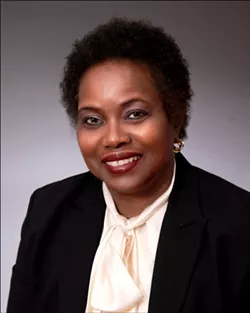
"I am running for Council because it is time that we deliver for Detroiters," she says. "Detroit is in a crisis, caused by the pandemic, poverty, bankruptcy, and the failed leadership of the city government. We have seen our population dwindle as City Council members, mayors, and emergency managers cut our city services, sold off our city assets, and robbed senior citizens of their homes and pensions. We need change, and I'm running to bring that change to the council."
Waters says the "turnaround" "hasn't happened for most Detroiters," adding, "Over the last decade, our community's wealth has been taken away, starting with our homes in the Great Recession, then our water, and then our property in Belle Isle. This dispossession of the Black community must end. Majority Black Detroit must thrive for Detroit to thrive."
Waters calls for fighting against tax giveaways to wealthy developers "who take money from our community while giving nothing back." She also calls for hiring more Detroiters for government contract jobs, and a crackdown on contractors using fake addresses to win city bids.
"One of the biggest challenges to getting our people back to work is the over-criminalization of our community," she says. "Due to decades of racist policing and laws, our citizens carry the burden of past convictions more than any other community. In the State Legislature, I fought hard to provide for greater expungement opportunities for returning citizens. I will work on the City Council to help our returning citizens get first access to job training and employment opportunities with any business in the city that receives tax credits/abatements. Finally, I will work to reform the Detroit Land Bank Authority and allow all long-term residents of Detroit to have an advantage over out-of-city/state/country investors in obtaining properties in the city."
Waters also says she would call for federal American Rescue Plan dollars to go to Detroit homeowners; reallocating Community Development Block Grant funding directly to community-based organizations and block clubs, putting the people's money into the people's hands; reforming our police department "to ban the use of racist technologies like facial recognition and military-grade equipment," moving those dollars into hiring and paying a fair wage to Detroiters to join the department; bring more mental health services to Detroiters, and hold polluters accountable.
Coleman A. Young, Jr.
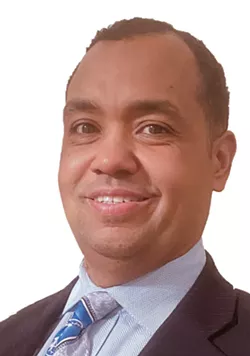
"My father ... would say, 'Always let the people find you working,'" Young says. "I have tried my very best to live up to that edict." In Lansing, the junior Young passed 13 laws to help working families that cut property taxes, gave working women paid maternity leave and kept their jobs safe, and brought money to his district, among others.
Young says his priorities include compensation for Detroiters whose homes were damaged by Michigan's historic floods, and investing in infrastructure "so that we don't have this depth of suffering happen again to our citizens," he says. He also calls for vaccinating many more people in Detroit, where the vaccination rate lags behind its surrounding suburbs.
He also calls for ramping up public safety, and investment in the neighborhoods "so that they become the flourishing economic centers for small-business entrepreneurship that we need to develop our communities and neighborhoods as economic centers," he says. He also calls for blight cleanup and affordable housing and public transportation.
Detroit City Council District 1
Darryl Brown
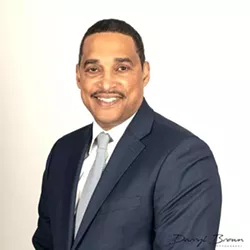
Darryl Brown is a lifelong Detroiter and resident of Rosedale Park for over 20 years. "Four years ago, voters like you trusted and elected me to serve as the Police Commissioner for District 1," says Darryl Brown, who is a retired Detroit Firefighter, the former Regional Director for the IABPFF (International Association of Black Professional Fire Fighters), and former IBEW Electrician. "As a former member on Rosedale Park Improvement Association Board, I have served as a block captain for 10 years and I currently serve on the Rosedale Park Radio Patrol," he says. "I am a Shriner of Marracci Temple #13 and a member of Jimmie Lunceford Lodge #45. I currently serve on Wayne County Sheriff CERT Reserve team and I am employed at DTE Energy as a System Supervisor."
Of Detroit's "turnaround," Brown says, "I believe the turnaround has been slow and focused on one area of the city. I would work to increase development to the neighborhoods and attract new industries to Detroit."
Brown says his top priorities will focus on mitigating blight, crime reduction, improving the Detroit Public Schools system, partnering with labor organizations for apprenticeship training, and improving our environment. "As your Councilman, I will work tirelessly to improve our community by creating safer and cleaner neighborhoods, increasing the number of public safety agents and volunteers, addressing blighted areas, managing environmental conditions, and fostering development," he says.
Quincy Coleman
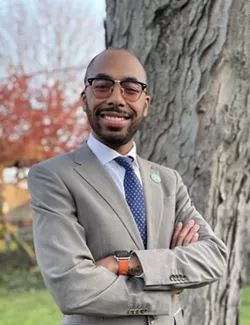
Quincy Coleman lives in the Grandmont-Rosedale Park area and says he was born and raised in the district, where he lived for his whole life, but he says he has worked on initiatives across the country, including a rent-control organization in California and anti-police-brutality initiatives in Ferguson and Minneapolis. In 2017, he ran for precinct delegate for the Democratic Party and was elected twice. "I worked on several state rep campaigns, I helped Governor [Gretchen] Whitmer get elected," he says. "And I felt as if now the time came ... my whole adult life, I've been doing advocacy work, and I would be doing it whether I'm in this position or not. And when this position opened up in the city council going through huge changes, and a lot of people not running, I felt it was time for me to put my hat in the ring for that."
He criticizes incumbent James Tate for holding the seat for 12 years. Of Detroit's "turnaround," he says, "I think that there's a lot of positive things that have been happening, and I don't think anyone can argue that Detroit isn't turning a corner. I think the real question is, is it equitable? Is everybody experiencing the same level of inclusion in that corner turn?"
He adds, "We didn't even have a Starbucks in Detroit five, six years ago. Yeah, Detroit's coming back, we're building skyscrapers, but who is it coming back for? And are we going to be included in that ... Or is this going to be, you know, another Oakland, California — just widespread, unapologetic gentrification?"
Coleman sees much current policy as harmful to Detroiters. "They're letting people get by, they're not sending people tax letters and conveniently letting people go five years behind, falling into tax foreclosure, and taking their houses for the land," he says. "[There are] a lot of shady business practices by the city and other investors going on in certain areas where developments are about to take place."
Coleman calls for a focus on sustainability, including installing solar fields to offset energy costs for residents, cleaning up the Rouge River, creating new walking trails, and planting new trees. "When people see it more beautiful and safe and clean, you're gonna see crime drop, you're gonna see poverty drop, people are gonna want to live in these areas, which increases the tax base even more," he says. "I think it's time for change, and that change is gonna come from outside the house, not in the house, because the people in the house — all they want to do is keep you out."
Krystal Larsosa

She calls Detroit's "turnaround" a "dial back to the post-Coleman Young era in which wealth and opportunity disparities exist along racial lines,' she says. "Superficial improvements are being made downtown, nanely developments that while appealing to the eye and attracting some additional tax dollars to help cover city costs, do little to address the heart of Detroit's challenges: we need to grow."
She says if she and her husband are elected, she will leverage her platform "as part of an unprecedented team ... to generate national attention and attract more residents and investment dollars to the city," she says. Larsosa also calls for boosting neighborhoods with projects such as creating locally owned vendor markets that also serve as gathering places and culture centers for the community.
She also calls for a restructuring of DPD, "divesting in militarization in order to invest in community-based public safety models that incentivize residency of officers while expanding secondary employment opportunities that increase their presence in and connection to the neighborhood while putting extra change in their pockets."
She also says water and housing are human rights, and calls for an end to water shutoffs and tax foreclosures, as well as millages that support affordable water and housing.
"Every Detroiter deserves to feel and be part of the change happening," she says. "The people need government we can touch."
Detroit City Council District 4
Ane Bomani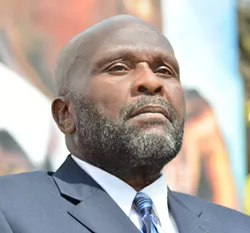
A native Detroiter, Ane Bomani is a retired social worker, a longtime community activist and organizer, and was a policy analyst and assistant to former City Council member Kwame Kenyatta. Bomani was appointed in 2019 to Detroit's Affordable Housing Task Force.
Of Detroit's "turnaround," Bomani says, "The present administration has been in office for two terms ... where [Mayor Duggan has neglected] all residents and fixed up downtown and specific areas. Detroit could well be on the verge of a significant turnaround with the right residents being elected to office. I will develop the correct narrative for the Detroit turnaround."
Bomani calls for building new affordable housing with a 30% Area Median Income (AMI) or lower, improving job training for Detroiters, reducing the price of water and sewerage, bringing back citizen patrols for neighborhoods, and bringing the cost of housing down. "Many legacy Detroiters had to move out of the city because of these expensive rentals and other housing," Bomani says. Bomani also calls for reopening the district's Monteith library and Maheras Recreation Center.
M.L. Elrick

"I am a watchdog who knows how government works and who demands excellence from everyone who draws a public paycheck," he says. "And I am a fearless truth teller."
Of Detroit's "turnaround," Elrick says, "I'm encouraged by the investment in the city's central business district, which before the pandemic had been transformed into a dynamic and exciting destination for visitors to Detroit. But I'm concerned that our neighborhood commercial corridors continue to struggle. And I believe it's time to increase grant and low-interest loan funds available to longtime residents who are struggling to make improvements to their homes. Our goal should be to attract new residents and businesses while supporting longtime Detroiters and local businesses who may need help staying in their homes or keeping their doors open."
Elrick also calls for neighborhoods to receive the same opportunities and incentives provided to downtown and the stadium district, "while holding developers responsible for living up to their end of the deals they make with the city," he says. He also calls for installing speed humps on residential streets, and reforming the police department to emphasize training officers as "guardians" rather than as "warriors." He also calls for improving officer pay and retention, diversifying the job classifications in the police department to include social workers, therapists, and specialists trained in de-escalation and building trust.
"I want to make sure that the people who have lived here and kept the city viable are not subject to second-class treatment while billionaires are lavished with tax breaks and special deals," he says. "I also want to see a return to the days when Detroiters could walk to work and support their families with jobs in their neighborhood that provide good wages and benefits."
Latisha Johnson
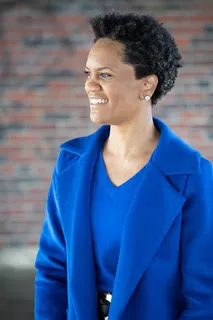
In 2014, Johnson founded MECCA (MorningSide, EEV, and Cornerstone Village Community Advocates) Development Corporation. "With development in Detroit on the rise, it seemed critical to our future that every resident’s voice be heard," she says. "Working with sustainability in mind, our teams engaged neighbors, business owners, and community partners to implement the ideas that grew out of community conversations." The program created a Community Closet to provide no-cost essentials for neighbors in need, senior computer skills and exercise classes, and youth skill-building programs, including home rehab skills.
"I also understand firsthand the challenges of balancing our residents’ needs with budget and logistical constraints," she says. "My tenures as Treasurer for the 5th Precinct Police/Community Relations Council and Vice Chair on the Detroit Board of Zoning Appeals taught me how important it is to recruit input and involvement from a wide cross-section of citizens, businesses and local officials. "
Of Detroit's "turnaround," Johnson says, "I am happy to witness the growth in Detroit. And, I want to see our city grow and develop in a responsible way that takes the needs and desires of all of our residents. I would like to see a more balanced approach between development downtown and the neighborhoods… without displacing current residents. We need solutions that address the growing disparities and that enable longtime Detroiters to stay in Detroit even while we are attracting new residents from across the country. I think every Councilperson should work with a robust and diverse Community Advisory Council to understand their residents’ priorities. Our district is blessed with many interested and active citizens that are eager and willing to help Council understand their issues and concerns and to work together on solutions (and I am sure our district is not unique). I will propose and support programs that address the issues that our neighborhoods are dealing with every day. "
If elected, Johnson says her priorities are equitable development, including affordable housing; improvements to the aging water infrastructure system, including fixing flooding and removing lead service lines; developing skill-building facilities for youths and seniors,; and a robust Citizen Advisory Council for the district to "facilitate community discussion and input and will hold representatives accountable to their promises."
"I am a strong proponent of the CAC and my actions will be directed by the voice of the people," she says.
Toson Knight

On Detroit's "turnaround": "I think Detroit is actually on the right track," he says. "We have a few bumps, of course, in the road." The historic flooding has been a major issue in his district, and he calls for an overhaul of the city's infrastructure to accommodate heavier rainfall. He also calls for the creation of a recreation center for his district, which does not have one, and installing speed humps on residential streets. Knight also calls for fixing blighted and abandoned homes. "We need to address nuisance issues that are causing good residents to leave the city," he says.
Ken Snapp

Snapp says his priorities include fixing the overassessment of Detroit homes' property taxes, developing a citywide blight removal plan, improving residential input and feedback, safety, and strengthening community benefit agreements for big developers.
"The most pressing issue Detroit faces is that 40% of Detroiters live in poverty," he says. "Detroit is also the most segregated city in the country, and the disparities are evident in the quality of life and opportunities afforded to our residents. We have to provide access to basic social goods. We must give citizens access to social goods so that we may start to build equity inside marginalized communities. Housing, food, education, health, and jobs are major pillars in the fight for social goods."
He says he has concerns with automaker Stellantis's new plant — touted as an accomplishment of Duggan's, citing air pollution in the district. He says he will demand Stellantis monitor its pollution. He adds, "Racial disparities need to be addressed in order for our city to thrive. We cannot continue to operate as if there is equity or equality in our city. We continue to segregate our neighborhoods and workplaces as if we were going back in time. The cost of living has drastically increased and has forced lifelong citizens out of their homes. We aren't being progressive enough to include everyone. We must fight to create actual policy that will not match the current blueprint that we have in place today. ... using the core tenets of intersectionality, we can create policy for the historically oppressed and marginalized groups, with an emphasis on Black and Brown Detroiters."
Detroit City Council District 7
John Bennett
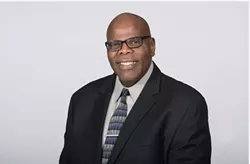
John Bennett says he has lived in District 7 for 52 of the 58 years he has been alive. He is a retired Detroit police officer who served 20 years with the department, and he ran for city council in 2009 and 2013, where he narrowly lost to Gabe Leland. "After that, I wasn't sure I wanted to be involved in politics anymore, but I kept getting asked by everyday Detroiters, neighbors, and friends what I was going to do and why I wasn't running anymore," he says. "It was those people who led me to this point. They want clean, honest, trustworthy government."
Bennett calls for a crackdown on drag racing and junk car lots, of which he says there are more than 40 in his community, as well as improved response times for police. "The primary issue holding back Detroit is lack of accountability," he says. "There is no accountability from government or its partners. If we have that and people are acting accordingly and ethically in their assigned roles, we could avoid many of the problems we have and deliver quality services to the people," adding, "If I'm elected, I intend to hold everyone at every level of government accountable and use the power I have as a city councilperson and my office to obtain the right action as opposed to wrong behavior."
He says, "It goes without saying that I've often disagreed with Mayor Duggan on how he goes about his job. I'm often not sure whose best interest he holds. However, given the fact that I may have to work with him, I will keep an open mind and have an open door in order to best serve my constituents. I think they would want me to do so. We are all accountable to the residents of this city. Sometimes I think that gets lost."
Fred Durhal
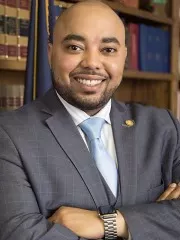
On Detroit's "turnaround": "I believe Detroit has made tremendous progress within the past few years. We do know that downtown is growing, that there are a lot of small businesses and a bigger business that have moved in the city of Detroit and allow Detroit the ability to generate tax revenue," he says. "But to improve Detroit, you have to stabilize neighborhoods. And I think that's one of the biggest issues that are being faced right now. ... We still have issues, obviously, as it relates to blight, abandonment, public safety." Durhal calls for the creation of a recreation center for the district, which currently does not have one, and also calls for making water more affordable and improving intergenerational wealth in the city.
"A lot of Detroit is still unemployed, so we got to get Detroiters back to work," he says. "That not only involves providing a job, but also providing some more skilled trade programs to train Detroiters and apprenticeship programs that will help our citizens get jobs of the future." Emphasizing smaller businesses over big developments is better "because small businesses tend to hire local residents," he says. He also calls for creating city-owned health care centers like the former Herman Kiefer Hospital. "We don't have that anymore, and that's something we can do at our recreation centers, to be able to provide access to local communities," he says. "So when we are in something like COVID, you don't have to drive all the way down to TCF Center."
Durhal says with his experience he can hit the ground running "from the first day that I am elected and sworn in."
Angy Webb
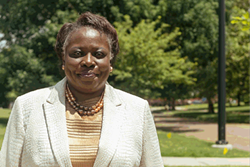
"I believe that we have had some positive things that have happened in Detroit," she says. "But I know that a lot of people are also suffering in the communities." Webb calls for reimbursing the $600 million that Detroiters were overcharged, "if not dollar for dollar, then by programs and being able to get future dollars knocked off of their taxes," she says. She also calls for improvements to city services. "I only see the sweepers maybe once a year," she says. "So I think they should go out a little more often than that to clean up in our community."
She adds, "If I lose, I will continue doing things in my community, because my main purpose is to say that we have a better community."
Part of our Detroit 2021 primary guide.
Stay connected with Detroit Metro Times. Subscribe to our newsletters, and follow us on Google News, Apple News, Twitter, Facebook, Instagram, or Reddit.


